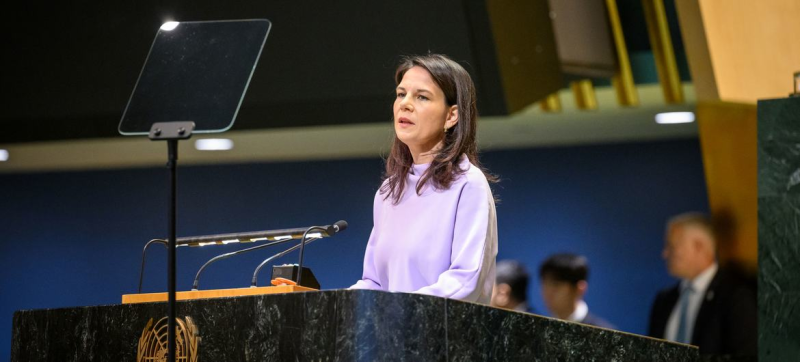- A Genocide Position Paper on the Plight of Palestine |
- Economy must move beyond narrow wealth accumulation: Yunus |
- Guterres Urges Recommitment to Two-State Israel-Palestine Solution |
- WHO Warns of Global NCD Crisis, Calls for Urgent Investment |
- Dhaka’s air turns ‘moderate’ on Tuesday morning |
UN Opens High-Level Week With Focus on Women’s Empowerment

General Assembly President Annalena Baerbock addresses the high-level meeting of the General Assembly on the thirtieth anniversary of the Fourth World Conference on Women.
Only the fifth woman to preside over the UN General Assembly in its 80-year history has praised the courage of those “who fought for every phrase, every word in the Beijing Declaration,” marking the 30th anniversary of the pivotal international conference on women’s empowerment.
During the landmark 1995 event in Beijing, countries came together to adopt the Beijing Declaration—a blueprint for advancing women’s rights.
At the high-level celebratory event on Monday, countries, civil society organisations, and representatives from academia and the private sector discussed ways to accelerate its implementation.
“For so many of us here in this room, we hold positions that when we ourselves were young, seemed unattainable, but are now almost normal for the next generation,” said Annalena Baerbock, referring to the notion that “women’s rights are human rights”—the rallying cry from First Lady Hillary Clinton 30 years ago in Beijing.
UN Secretary-General António Guterres described the declaration as “the most ambitious global political commitment on women’s rights ever achieved,” adding that it has helped advance legal protection, political participation, and education for women worldwide.
Executive Director of UN Women Sima Bahous noted that girls are far more likely to finish school today than at any other time in history. She highlighted that the number of women in parliament has almost doubled, and nearly 100 discriminatory laws have been reversed globally in the past five years alone.
“Every step forward proved the same truth: gender equality works,” Ms. Bahous said. “But progress has not been fast enough.”
A new report from UN Women released earlier this month found that none of the gender equality Sustainable Development Goals are on track. Furthermore, 676 million women and girls now live under the shadow of deadly conflict—the highest figure recorded since the 1990s.
Cecilia Suárez, UN Global Advocate for the Spotlight Initiative—a groundbreaking programme to end violence against women and girls—said it had shown “it is possible to make positive and concrete results in this fight.”
“What is required is leadership from those who have gathered here. Leadership that fosters reforms,” she added.
Speaking about the many women around the world who continue to experience injustice, human rights activist and Yazidi survivor of ISIL’s sex trafficking, Nadia Murad, urged the international community to fund women’s organisations on the frontlines, guarantee women’s participation in peace and security, and hold perpetrators accountable.
“The next generation of women and girls deserve to inherit no more promises but the reality of justice, equality and dignity,” Ms. Murad said.

